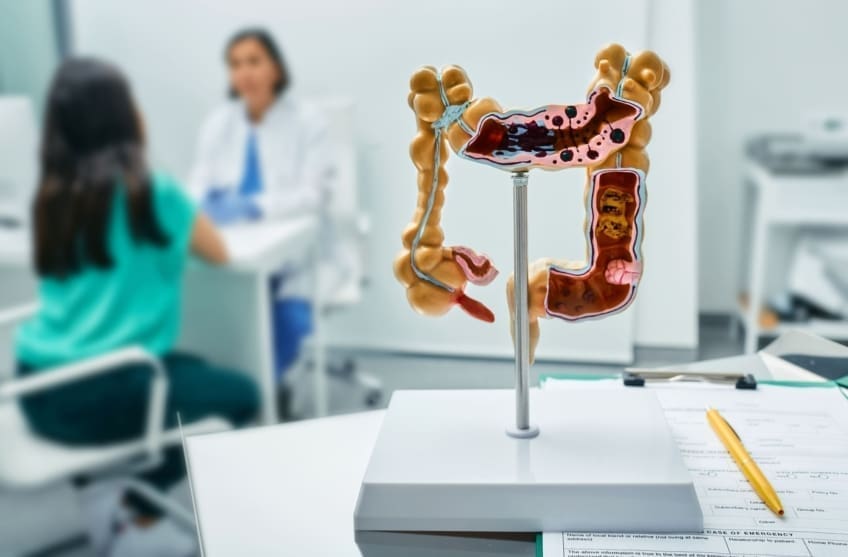
What is Crohn’s disease?
Crohn’s disease is an inflammatory bowel disease (IBD) that causes ulcers to form in the gastrointestinal (GI) tract anywhere from the mouth to the anus. Crohn’s disease can have “skip” areas that are normal. These normal areas lie in between areas that are affected. Some people who have Crohn’s disease have severe symptoms. Others have symptoms that are not as severe. Some people who have the disease have long periods without symptoms, even without getting treatment. Others who have more severe symptoms will need long-term treatment or even surgery.
Symptoms of Crohn’s disease
The symptoms of Crohn’s disease vary, depending on which part or parts of the gastrointestinal (GI) tract is/are affected. Common symptoms include:
- Diarrhea
- Stomach cramps
- Abdominal pain that comes and goes
- Blood in your stool
- Low appetite
- Unintended weight loss
Other less common symptoms may include
- Fever
- Joint pain
- Eye problems
- Skin problems
- Feeling tired (called fatigue)
Symptoms may be mild or severe, and they can come and go. Symptoms can start suddenly or gradually.
What causes Crohn’s disease?
Doctors don’t yet know exactly what causes Crohn’s disease. It seems to run in families, which means that genetics play a role. Many researchers believe that a problem with the immune system causes inflammatory bowel diseases. Normally, the immune system protects your body from infection. In people who have an inflammatory bowel disease, the immune system mistakes food, healthy bacteria, and other substances for an infection. This causes the immune system to attack the cells of the intestine, which leads to inflammation.
How is Crohn’s disease diagnosed?
Your doctor will give you a physical exam and listen to you describe your symptoms. To help diagnose the problem, your doctor may order a number of tests, including blood tests and stool samples. Additionally, your doctor may order one or more procedures to help them view your colon. For example, lower GI endoscopy procedures include colonoscopy and flexible sigmoidoscopy. During these procedures, your doctor uses a narrow, flexible tube to look directly inside your large intestine. Upper GI endoscopy allows a look at your stomach and small intestine for ulcers. For this type of endoscopy, you may swallow a small camera (called capsule endoscopy). If not, your doctor inserts a scope into your GI tract through your mouth.
Your doctor may also order other imaging tests such as X-rays, a CT scan, or an MRI.
Can Crohn’s disease be prevented or avoided?
Crohn’s disease cannot be prevented, but you can make lifestyle changes to minimize symptoms. The best thing you can do is to take good care of yourself. It’s important to eat a healthy diet. Depending on your symptoms, your doctor may ask you to reduce the amount of fiber or dairy products in your diet. It also may be necessary to limit or avoid caffeine, alcohol, and carbonated beverages. In addition to eating well, you need to get enough rest and exercise regularly. It’s also important that you learn to manage the stress in your life. When you become overly upset by things that happen at home or at work, your intestinal problems can get worse.
Crohn’s disease treatment
The goal of treatment is to get rid of the inflammation that causes your symptoms. Many types of medicine can help reduce inflammation. Talk to your doctor about anti-inflammatory drugs and drugs that suppress the immune system. Some medicines are needed only during flare-ups, however, you may need long-term medicines to suppress your immune system. Depending on your symptoms, your doctor may also recommend these medicines and supplements:
- Antibiotic
- Anti-diarrheal
- Anti-inflammatory (aminosalicylates)
- Corticosteroid (steroid)
- Laxative
- Pain reliever
- Vitamin supplements
In severe cases of Crohn’s disease, you may need to go to the hospital for intravenous (IV) fluids or surgery.
A team of doctors will most likely oversee your treatment. This team may include your family physician, a gastroenterologist (a specialist in stomach and intestinal disorders), and, possibly, a surgeon.
Living with Crohn’s disease
If you have inflammatory bowel disease, you are at an increased risk for colon cancer. Therefore, it’s important to talk to your doctor about when to start screening for colon cancer and how often to have screening.
Crohn’s disease can keep coming back, and its symptoms can be unpredictable. This cycle can cause patients who have these illnesses to become depressed. If you feel depressed, talk with your family doctor. They may be able to prescribe an antidepressant medicine could help you feel better.
How can I get more information?
You can understand and manage your illness better if you are informed. So be sure to ask questions and read about IBD. You can also discuss treatments with your doctor. Finally, consider joining a patient support group, especially if you have severe symptoms.
Questions to ask your doctor
- How will my Crohn’s disease be treated?
- Will I need surgery? Are there other options?
- What lifestyle changes can I make to help Crohn’s disease?
- What are some medicines used to treat Crohn’s disease and what are the possible side effects?
- Are my children at risk of getting Crohn’s disease?
Resources
![]()
Copyright © American Academy of Family Physicians
Esta información proporciona una visión general y puede que no se aplique a todos. Hable con su médico de familia para averiguar si esta información se aplica a usted y para obtener más información sobre este tema.






